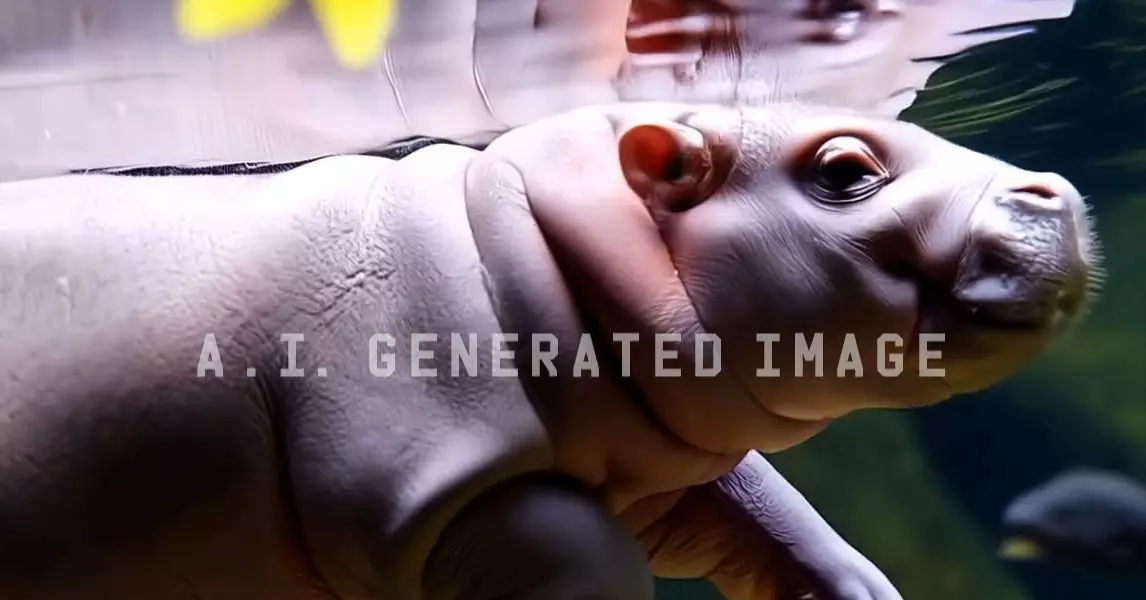Meta, a leader in the realm of social media and technology, has recently unveiled an ambitious artificial intelligence project: Movie Gen. This innovative tool aims to transform how video content is created by using AI to generate hyper-realistic video and audio clips. The announcement follows a series of developments presented during Meta’s Connect event, where the latest hardware and updates to their prominent Llama language model were showcased. As the digital landscape evolves, tools like Movie Gen signify a remarkable shift in content creation and consumption.
To provide insight into Movie Gen’s potential, Meta released 10-second clips exemplifying the model’s capabilities. Among the examples was a charming video of a baby hippo navigating water, akin to scenes seen in popular animations. However, the tool goes beyond generating simple clips; it allows for intricate modifications to existing footage. For instance, a clip demonstrated the transformation of a woman in virtual reality gear into a character adorned with steampunk binoculars, showcasing the nuanced type of editing that users can expect from this AI system.
The model’s ability to produce synchronized audio enhances the overall experience. Clips featured realistic sounds, such as the splashing of water beside an AI character, the roar of a sports car, and a snake slithering through foliage, enriching the video with a cinematic quality. This level of detail emphasizes not just the technological advancement represented by Movie Gen, but also how it can revolutionize the narrative storytelling process.
Delving into the technicalities, Movie Gen employs a staggering 30 billion parameters for video generation and 13 billion for audio. In AI, parameter count is often an indicator of a model’s capacity and performance, and Movie Gen claims superiority over its competitors in achieving higher video quality. For context, this places Movie Gen below the 405 billion parameters of Llama 3.1, illustrating a focused approach toward audio-visual content rather than text.
Moreover, Movie Gen is capable of generating high-definition videos that can reach lengths of up to 16 seconds, allowing for compact yet engaging content pieces that resonate with the fast-paced consumption habits of modern audiences. This unique feature positions Movie Gen as a potent tool for creators looking to engage viewers on platforms that thrive on quick content delivery.
While the advancements of Movie Gen are undeniably exciting, there lies an underlying concern about the ethical considerations of AI training data. Meta’s announcement vaguely mentions that the model was developed using a combination of licensed and publicly available datasets. However, the specifics of these datasets remain elusive. This lack of transparency is not uncommon in the industry, where questions persist about the datasets used to train generative AI systems. As ethical considerations regarding content sourcing continue to evolve, the implications for accountability in AI development can be profound.
As the demand for personalized and dynamic content increases, the possibilities that Movie Gen unlocks are both thrilling and complex. Potential applications could manifest within Meta-owned platforms such as Facebook, Instagram, and WhatsApp, allowing users to create tailored video experiences with ease. This approach would align with Meta’s existing vision of enticing user interaction through immersive content.
Comparing Movie Gen to similar offerings in the market, such as OpenAI’s Sora, which has yet to be made widely available, it remains to be seen when and how Meta will liberate Movie Gen for public use. The space for innovative AI-driven content creation is expanding rapidly, with other players like Google hinting at making their AI tools accessible in platforms like YouTube Shorts next year.
Movie Gen signifies a monumental step forward in AI-driven video technology, poised to reshape how content is produced and consumed. While the excitement surrounding its potential is palpable, it is essential to navigate the ethical landscape that accompanies such advancements in AI. As creators eagerly await the practical application of this technology, one thing remains certain: the landscape of video media will never be the same again. The innovative capabilities of Movie Gen could herald an era where personalized, high-quality video content is not just a luxury for professionals but an accessible reality for all users.

